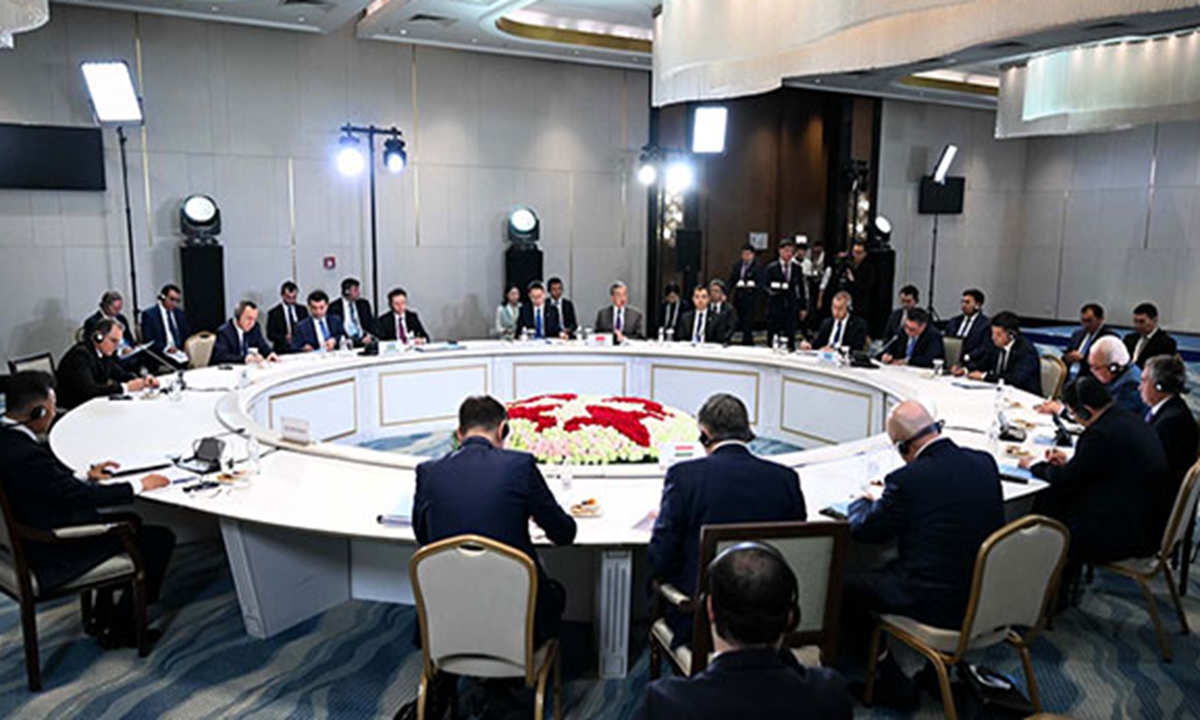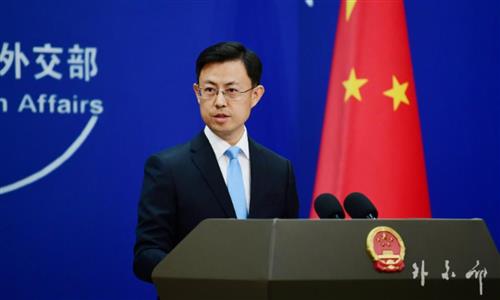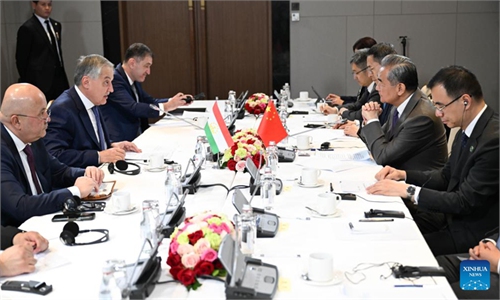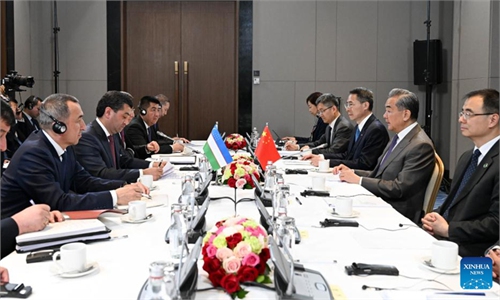China puts forward five points of proposal for deepening China-Central Asia cooperation
China's countermeasures safeguard its interests, international rules and justice amid rising unilateralism: FM

The Sixth China-Central Asia Foreign Ministers' Meeting is held in Almaty, Kazakhstan on April 26, 2025. Photo: Chinese Foreign Ministry website
Wang Yi, member of the Political Bureau of the Communist Party of China Central Committee and Minister of Foreign Affairs, put forward five points of proposal for deepening China-Central Asia cooperation while attending the Sixth China-Central Asia Foreign Ministers' Meeting in Almaty, Kazakhstan on Saturday. During the meeting, he stressed that amid rising unilateralism and trade protectionism that are disrupting global free trade, China, as the world's second largest economy and a responsible major country, will remain unwavering in advancing high-standard opening-up regardless of how the international situation evolves and pursue shared development with its neighbors and share opportunities with the world.
Joined by counterparts from Kazakhstan, Kyrgyzstan, Tajikistan, Uzbekistan and Turkmenistan, the meeting served as comprehensive political preparation for the second China-Central Asia Summit to be held within this year, while facilitating in-depth discussions on advancing all-dimensional cooperation between China and Central Asia, the Chinese Foreign Ministry said in a statement on Saturday.
Noting that unilateralism and trade protectionism are rapidly rising, while the "deglobalization" trend is severely impacting the free trade system, Wang said that the US, in wilful disregard of international norms, has arbitrarily imposed tariffs on over 180 countries, infringing upon their legitimate rights and interests, violating WTO rules, damaging the rules-based multilateral trading system, and destabilizing the global economy.
China's necessary countermeasures serve not only to safeguard its lawful interests, but also to uphold international rules, world order, and global fairness and justice, Wang noted. As the world's second largest economy and a responsible major country, China will remain unwavering in advancing high-standard opening-up regardless of how the international situation evolves, Wang said.
The Chinese top diplomat also put forward five points of proposal for deepening China-Central Asia cooperation - upholding friendly and harmonious relations featuring mutual trust, boosting mutually beneficial cooperation, enhancing institutional development, pursuing fairness and justice, and aiming for everlasting friendship.
In particular, Wang said China stands ready to import more quality green agricultural products from Central Asia, implement more high-quality cooperation projects, expand cooperation in emerging fields, and foster new productive forces through collaboration. Meanwhile, the two sides will increase infrastructure investment to build a multi-dimensional and diversified regional connectivity network.
According to the statement, participants at the meeting spoke highly of the high-level solidarity and mutual trust with China, as well as the important role of the China-Central Asia cooperation mechanism. They also expressed support for China's proposal to build a community with a shared future with neighboring countries.
The Central Asian countries will strengthen alignment between their national development strategies and China's Belt and Road Initiative. They will also deepen cooperation in areas including trade facilitation, industrial investment, infrastructure connectivity, green mining, agricultural modernization, and people-to-people exchanges.
The countries are also committed to jointly combating the "three evil forces" - terrorism, extremism and separatism, as well as transnational crime, to maintain regional peace and stability.
Participants at the meeting recognized China as a stabilizing force in this turbulent world, serving as a model for multilateralism. They reaffirmed their commitment to multilateralism and agreed to enhance dialogue within frameworks such as the UN, while rejecting unilateral protectionist practices.
The frequent interactions at both the head-of-state and ministerial levels demonstrate that China and Central Asian countries regard each other as important strategic partners, and this sustained positive atmosphere stems from the multi-tiered network of cooperation that two sides have established over the years. This multi-tiered, wide-ranging partnership has created a strong stability unshaken by external changes, Zhu Yongbiao, Executive Director of the Belt and Road Research Center at Lanzhou University, told the Global Times on Saturday.
Li Yongquan, director of the Eurasian Social Development Research at the Development Research Center of the State Council, added that while Central Asia has established various kinds of cooperation mechanisms with different parts of the world, its relations with China are distinctive due to their immediate neighborhood - which means interlinked infrastructure, forming an integral part of each other's development environment.
"More importantly, China's cooperation with Central Asia doesn't represent geopolitical games, but rather a joint exploration of development strategies," Li told the Global Times on Saturday.
With Central Asian nations engaged in pursuing their respective reform agendas, their enthusiasm for regional integration has markedly increased, Li noted. Therefore, they hold strong expectations for China's participation in their economic development, with particular demand for Chinese expertise in renewable energy and agricultural technologies. Translating these complementary advantages into concrete cooperation projects carries significant strategic value for all parties involved, Li said.
Chinese experts noted that during this trip, Wang has elaborated on China's firm stance on US tariff policies on various occasions in meeting with his counterparts from Uzbekistan and Tajikistan on Friday, and at the Sixth China-Central Asia Foreign Ministers' Meeting on Saturday.
"China's repeated assertion on its stance toward the issue not only serves to convey a message to the US, but also demonstrates Beijing's coordination with its strategic partners, showcasing its determination and confidence in defending both national interests and a fair international order," Zhu noted.



